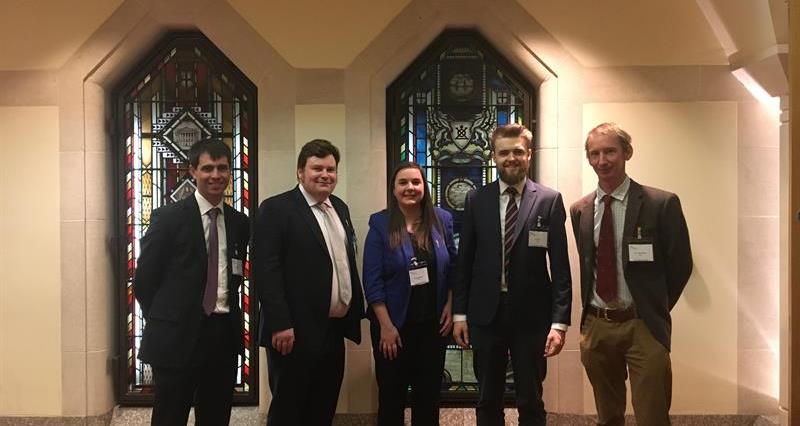The seven livery companies organise this annual invitation-only event and share a common function and craft link to supply and prepare food. This year the key themes of the lecture were trust, technology, trends and transparency.
“Instinct to share food and drink, company and conversation is a universal one” said the Representative Lord Mayor, Alderman Sir Alan Yarrow in his welcome speech.
The food and drink sector contributes £110 billion to the economy and employs four million people. Issues around the supply of food and drink are far wider, enduring on politics, international stability, environment, global trade processes and development.
“The evolution of technology will affect food as much as it will other sectors” said Dominic Blakemore which made his lecture title ‘trust and tech – the future of food’ so relevant.
Having spent seven years on the board at Compass, Dominic is currently the Group Chief Executive of the Compass Group, the largest food service business in the world. The company operates in 50 countries, employs over 600,000 people, serves over five billion meals a year and has over £23 billion in revenue. Two billion of this is from the UK which also accounts for 10% of their total workforce and is the second largest market for the company behind the US.
Clients of the food service company are as diverse as the military and hospitals to the Wimbledon All England Club and Morgan Stanley. They also have a range of brands which enable them to offer a unique service depending on the needs of both clients and their customers. Dominic said their good relationship with clients gives unique insight into current trends and clues as to how these trends may continue. He used this insight together with the trends we see evolving today to paint what he felt could be a future picture of the food industry.
The lecture started by asking the audience to imagine 2050 followed by a myriad of questions about a future world: how will we live, travel and eat, how will businesses operate, will there be employees as we know them now or will robotics take over, what will consumers want and how will we serve their needs? “Ignoring what the future looks like is perilous” said Dominic.
An ever-increasing need for food
With an estimated world population of over 9 billion in 30 years’ time, increasing the need for food will have huge pressure on natural resources. This was one of the common themes which the lecture focussed on as Dominic believes food will define the future more than any other sector. Global demand for food even today has overstretched the system. His prediction was that global demand for protein will increase by around 80% from today’s levels and although these demands bring pressures, they also bring opportunities.
See also: NFU Conference looks to farming in 2040
Such opportunities were explored by comparing generations and it was interesting to hear that Millennials and Generation Z now outnumber baby boomers, and by next year more than 50% of the workforce will be millennials or younger.
Younger generations are characterised at one extreme as lazy, entitled and self-obsessed, however they are also open minded, liberal, self-expressive, upbeat and passionate about equality. They appear to be more resilient and have higher self-belief compared to older siblings.
Another category, Generation C, are defined by a mindset and attitude centred around creation, connection and community, rather than an age bracket. These individuals are expressive, trend-makers and stay constantly connected. They value relevance and originality, define social networks and extensively use platforms such as YouTube.
Watch the City Food Lecture and panel debate in full by clicking here
Food is a part of identity
Dominic addressed the explosion of food on social media which has increased the occurrence of eating out. The demand for fast, casual and convenient formats which offer healthy food on-the-go in inspiring formats, is predicted to increase going forwards and trends will be even more about consumer preferences.
While on one hand rising urban populations are attributed to farmers being pushed further from their consumers, it was interesting to hear that artisan or locally produced food which directly links the producer and consumer, building loyalty and value, is rising in popularity and helping to make consumers feel part of the story. Today’s consumer is interested in production methods and environmental impact, how and by whom food was produced and how it arrived in front of them.
- Nine out of ten consumers rate ingredient transparency as important or very important and a trend in young people is caring about fresh ingredients.
- 70% of consumers think locally produced products are fresher and combined with demand for simple food this suggests the expansion of locally produced will only increase.
Transparency and trust
Clean eating, freshness and localism are all expressions of a growing desire for transparency and trust in the food industry. One of the key themes of the lecture was the importance to understand the driver of trends so we can be ahead of the curve.
Dominic believes trust is the currency of the next decade and it’s imperative to build trust from the ground up. Six out of ten consumers refuse to buy products form companies they do not trust. Nine out of ten millennials will only purchase from companies who support local causes.
Considering this, Compass have strengthened their sustainability agenda and believe supply chain partnerships will be even more important going forwards, sharing systems and delivering greater efficiencies and diversity.
Technology and trends
Technology is influencing trends and vice versa. Innovative solutions start with the problem and then consider how technology can help. A challenge going forwards will be how the food industry looks at itself from a different angle.
The technology we have today such as self-service tills is only just scratching the service of what can be achieved. Although initially this kind of technology frustrated shoppers and resulted in increased theft, it has been refined and is now more user friendly.
Predicting the future is difficult when revolutionary technology has not yet been invented, however Dominic stated voice, video and virtual technologies are likely to increase in food marketing.
He also predicts that we are all likely to have a virtual self which will be pre-programmed with food preferences and medical data. 3D printing of food, virtual menus in restaurants and digital information such as portion size and calorie values for home cooking were also highlighted as potential features in future day-to-day life. Connecting technology and data will be key for consumers and critical for businesses.
Dominic concluded that innovation is imperative for us all and we must embrace it. It’s vital that whilst meeting the needs of the growing population we minimise the impact on the environment. Many of the clues for the future already exist and it’s our responsibility to make a difference.

Thanks to the Worshipful Company of Poulters, past participants on the NFU’s Poultry Industry Programme were able to attend the lecture.
Charles Roe, an egg producer from Lincolnshire, found the evening enlightening, he said: "The lecture was broad but very thought-provoking insight into the wider food policies of both this country and the rest of the world. I am very grateful for the opportunity to attend and would recommend the enjoyable evening to anyone involved in the food industry or someone wanting to learn more about the links between food and its importance in society”.
Tom Glen, ABN Account Manager, said: “Dominic Blakemore presented a thought-provoking concept of future food consumption, highlighting how millennial consumers shopping habits are likely to be different to that of their parents, with food provenance and environmental footprint featuring heavily in their decision-making. As NFU President Minette Batters pointed out in the panel debate – British farming is in a great position to deliver produce that meets the changing needs and preferences of consumers, I think our challenge going forwards will be communicating that effectively to the general public”.
Chris White from the Fresh Produce Journal chaired the panel discussion which saw Dominic joined on stage by three panellists: Minette Batters (NFU President), Professor Corinna Hawkes, (Director of Centre for Food Policy School of Arts and Social Sciences, City University) and Tamira Treffers-Herrera (Regional Head Europe at Rabobank).
Chris Rumming, a seasonal turkey producer from near Swindon, said: “The panel discussion was the highlight for me, I was particularly surprised to hear during the debate that 60% of teenagers consume a sugar drink every day while only 30% of the same age group consume fruit each day. There seemed to be an overwhelming support in the room for British grown food and our agricultural industry which was reassuring."
The discussion around how fast and far food production is going to change in the next 30 years really made me realise that although lab and high-tech food production methods are bound to increase rapidly there will still be a place for ‘traditional' farming”.
Read more from the NFU Poultry team:
